
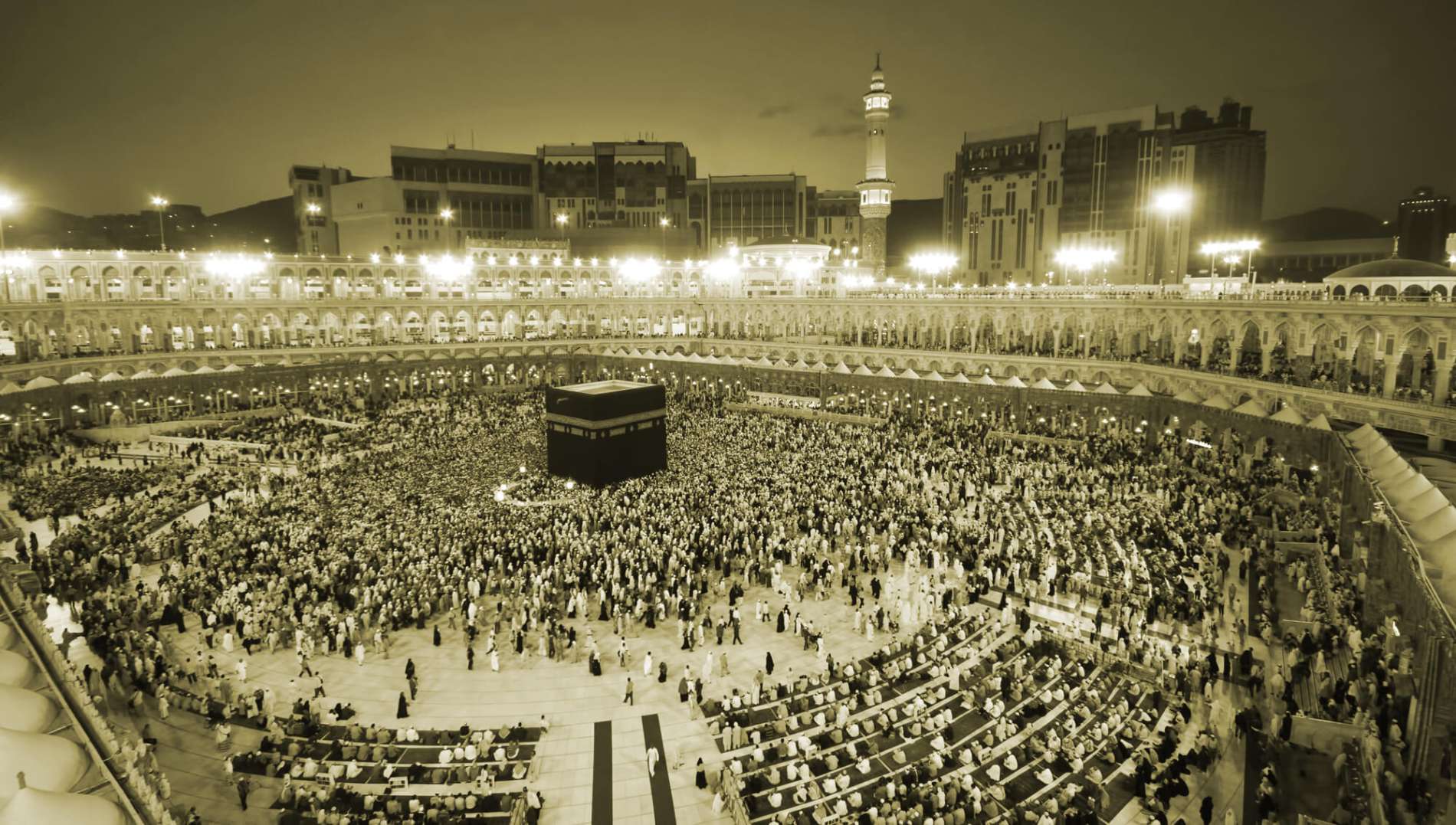
يَا أَيُّهَا الَّذِينَ آمَنُواْ لاَ تُحِلُّواْ شَعَآئِرَ اللّهِ وَلاَ الشَّهْرَ الْحَرَامَ وَلاَ الْهَدْيَ وَلاَ الْقَلآئِدَ وَلا آمِّينَ الْبَيْتَ الْحَرَامَ يَبْتَغُونَ فَضْلاً مِّن رَّبِّهِمْ وَرِضْوَانًا وَإِذَا حَلَلْتُمْ فَاصْطَادُواْ وَلاَ يَجْرِمَنَّكُمْ شَنَآنُ قَوْمٍ أَن صَدُّوكُمْ عَنِ الْمَسْجِدِ الْحَرَامِ أَن تَعْتَدُواْ وَتَعَاوَنُواْ عَلَى الْبرِّ وَالتَّقْوَى وَلاَ تَعَاوَنُواْ عَلَى الإِثْمِ وَالْعُدْوَانِ وَاتَّقُواْ اللّهَ إِنَّ اللّهَ شَدِيدُ الْعِقَابِ (5:2)-"O ye who believe! Profane not Allah's monuments nor the Sacred Month nor the offerings nor the garlands, nor those repairing to the Sacred House, seeking the grace and pleasure of Allah. But when ye have left the sacred territory, then go hunting (if ye will). And let not your hatred of a folk who (once) stopped your going to the Inviolable Place of Worship seduce you to transgress; but help ye one another unto righteousness and pious duty. Help not one another unto sin and transgression, but keep your duty to Allah. Lo! Allah is severe in punishment" (Quran 5:2) -
الْحَجُّ أَشْهُرٌ مَّعْلُومَاتٌ فَمَن فَرَضَ فِيهِنَّ الْحَجَّ فَلاَ رَفَثَ وَلاَ فُسُوقَ وَلاَ جِدَالَ فِي الْحَجِّ وَمَا تَفْعَلُواْ مِنْ خَيْرٍ يَعْلَمْهُ اللّهُ وَتَزَوَّدُواْ فَإِنَّ خَيْرَ الزَّادِ التَّقْوَى وَاتَّقُونِ يَا أُوْلِي الأَلْبَابِ (2:197)-"The pilgrimage is (in) the well known months, and whoever is minded to perform the pilgrimage therein (let him remember that) there is (to be) no lewdness nor abuse nor angry conversation on the pilgrimage. And whatsoever good ye do Allah knoweth it. So make provision for yourselves (here after); for the best provision is to ward off evil. Therefore keep your duty unto Me, O men of understanding" (Quran 2:197) -
"Whoever performs Hajj and does not commit sin, nor disputes unjustly (during Hajj), then he returns from Hajj as pure and free from sins as on the day on which his mother gave birth to him"(Bukhari & Muslim)
1. Invoke Allah from Fajr to Ishraaq
The Messenger of Allah (peace be upon him) said:
Whoever prays (Fajr) in congregation and then sits in the place where he prayed remembering Allah until the sun rises and then prays two rak’ahs has the reward of a complete Hajj and `Umrah. He emphasized “complete” three times.
2. Gaining Knowledge
The Prophet said:
The one who goes out to the mosque wanting only to learn good or teach it has the reward of a complete Hajj.
3. Praying in Congregation
The Prophet said:
Has Allah not rendered for you the Isha’ prayer in congregation equal to Hajj, and the Fajr prayer in congregation equal to ‘Umrah? (Muslim)
4. Attending the Friday Prayer
Sa’id bin al-Musayyib said that performing the Friday Prayer is “more beloved to Me than a nafl Hajj.”
5. Performing the Eid Prayer
One of the companions said:
Going out to pray Eid al-Fitr is equal to performing `Umrah and going out to pray Eid al-Adha is equal to performing Hajj.
6. Executing the Needs of a Fellow Muslim
Hasan al-Basri said:
“Going to fulfill the need of your brother is better for you than performing Hajj after Hajj.”
7. Obedience to Parents
The Prophet commanded one of the companions to be good to his mother. If you do so, he said:
You are like a Haj pilgrim, a person performing `Umrah and someone striving for the sake of Allah (mujahid).
8. Dhikr
One of the companions of the Prophet has been reported:
He who recites Subhanallah 100 times in the morning and another 100 times in the evening is like one who performed Hajj 100 times!
9. Firmly Restraining from Forbidden Acts
Some of the Pious predecessors said:
“To abstain from an iota of wrong is better than five hundred (Nafl) Hajj.”
10. Any Act of Good During the First 10 Days of Dhul Hijjah
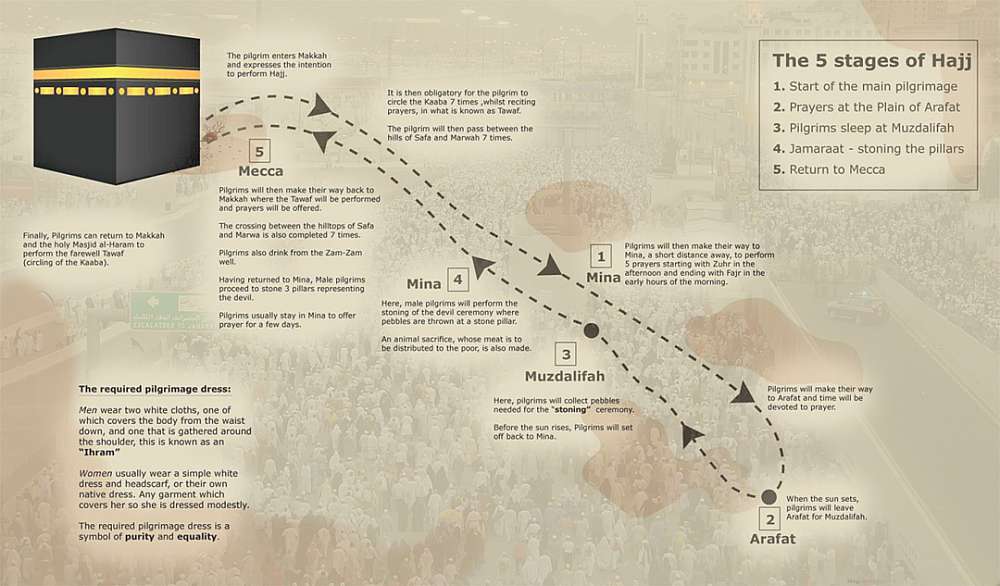
Hajj literally means 'to set out for a place'. Islamically however it refers to the annual pilgrimage that Muslims make to Makkah with the intention of performing certain religious rites in accordance with the method prescribed by the Prophet Muhammad .
Hajj and its rites were first ordained by Allah in the time of the Prophet lbrahim [Abraham] and he was the one who was entrusted by Allah to build the Kaba - the House of Allah - along with his son Ismail [Ishmael] at Makkah. Allah described the Kaba and its building as follows:
"And remember when We showed Ibrahim the site of the [Sacred] House [saying]: Associate not anything [in worship with Me and purify My House for those who circumambulate it [i.e. perform tawaaf] and those who stand up for prayer and those who bow down and make prostration [in prayer etc.]." [Surah Al-Hajj 22:26]
After building the Kaba, Prophet Ibrahim would come to Makkah to perform Hajj every year, and after his death, this practice was continued by his son. However, gradually with the passage of time, both the form and the goal of the Hajj rites were changed. As idolatry spread throughout Arabia, the Kaba lost its purity and idols were placed inside it. Its walls became covered with poems and paintings, including one of Jesus and his mother Maryam and eventually over 360 idols came to be placed around the Kaba.
During the Hajj period itself, the atmosphere around the sacred precincts of the Kaba was like a circus. Men and women would go round the Kaba naked, arguing that they should present themselves before Allah in the same condition they were born. Their prayer became devoid of all sincere remembrance of Allah and was instead reduced to a series of hand clapping, whistling and the blowing of horns. Even the talbiah [1] was distorted by them with the following additions: 'No one is Your partner except one who is permitted by you. You are his Master and the Master of what he possesses'.
Sacrifices were also made in the name of God. However, the blood of the sacrificed animals was poured onto the walls of the Kaba and the flesh was hung from pillars around the Kaba, in the belief that Allah demanded the flesh and blood of these animals.
Singing, drinking, adultery and other acts of immorality was rife amongst the pilgrims and the poetry competitions, which were held, were a major part of the whole Hajj event. In these competitions, poets would praise the bravery and splendor of their own tribesmen and tell exaggerated tales of the cowardice and miserliness of other tribes.
Competitions in generosity were also staged where the chief of each tribe would set up huge cauldrons and feed the pilgrims, only so that they could become well-known for their extreme generosity.
Thus the people had totally abandoned the teachings of their forefather and leader Prophet Ibrahim. The House that he had made pure for the worship of Allah alone, had been totally desecrated by the pagans and the rites which he had established were completely distorted by them.
This sad state of affairs continued for nearly two and a half thousand years. But then after this long period, the time came for the supplication of Prophet Ibrahim to be answered: "Our Lord! Send amongst them a Messenger of their own, who shall recite unto them your aayaat (verses) and instruct them in the book and the Wisdom and sanctify them. Verily you are the 'Azeezul-Hakeem [the All-Mighty, the All-Wise]." [Surah Al-Baqarah 2:129]
Sure enough, a man by the name of Muhammad ibn 'Abdullaah was born in the very city that Prophet Ibrahim had made this supplication centuries earlier.
For twenty-three years, Prophet Muhammad spread the message of Tawheed [true monotheism] - the same message that Prophet Ibrahim and all the other Prophets came with - and established the law of Allah upon the land. He expended every effort into making the word of Allah supreme and his victory over falsehood culminated in the smashing of the idols inside the Kaba which once again became the universal center for the worshippers of the one True God.
Not only did the Prophet rid the Kaba of all its impurities, but he also reinstated all the rites of Hajj which were established by Allah's Permission, in the time of Prophet Ibrahim. Specific injunctions in the Quran were revealed in order to eliminate all the false rites which had become rampant in the pre-Islamic period. All indecent and shameful acts were strictly banned in Allah's statement: "There is to be no lewdness nor wrangles during Hajj." [Surah al-Baqarah 2:197]
Competitions among poets in the exaltations of their forefathers and their tribesmen's achievements were all stopped. Instead, Allah told them:
"And when you have completed your rites [of Hajj] then remember Allah as you remember your forefathers; nay with a more vigorous remembrance." [Surah al-Baqarah 2:200]
Competitions in generosity were also prohibited. Of course, the feeding of the poor pilgrims was still encouraged as this was done during the time of Prophet Ibrahim but Allah commanded that the slaughtering of the animals which was done for this purpose should be done seeking the pleasure of Allah rather than fame and the praise of the people. He said:
"So mention the name of Allah over these animals when they are drawn up in lines. Then, when they are drawn on their sides [after the slaughter], eat thereof and feed the beggar who does not ask, and the beggar who asks." [Surah al-Hajj 22:36]
As for the deplorable practice of spattering blood of the sacrificed animals on the walls of the Kaba and hanging their flesh on alters, then Allah clearly informed them that:
"It is neither their meat nor their blood that reaches Allah, but it is Taqwaa (piety) from you that reaches Him." [Surah al-Hajj 22:37]
The Prophet also put a stop to the practice of circling the Kaba in a state of nudity and the argument that the pagans put forward to justify this ritual was sharply rebutted in Allah's question: "Say: Who has forbidden the adornment [i.e. clothes] given by Allah which He has produced for His Slaves?" [Surah al-A'raaf 7:32]
Another custom which was prohibited through the Quran was that of setting off for Hajj without taking any provisions for the journey. In the pre-Islamic period, some people who claimed to be mutawakkiloon (those having complete trust in Allah) would travel to perform Hajj begging for food through the whole journey.
They considered this form of behavior a sign of piety and an indication of how much faith they had in Allah. However Allah told mankind that to have sufficient provisions for the journey was one of the preconditions for making Hajj. He said: "And take a provision [with you] for the journey, but the best provision is at-Taqwaa (piety)." [Surah al-Baqarah 2:197]
In this way, all the pre-Islamic practices, which were based on ignorance, were abolished and Hajj was once more made a model of piety, fear of Allah, purity, simplicity and austerity. Now, when the pilgrims reach the Kaba, they no longer find the carnivals and the frolic and frivolity that had once occupied the minds of the pilgrims there before.
Now, there is the remembrance of Allah at every step and every action and every sacrifice was devoted to Him alone. It was this kind of Hajj that was worthy of the reward of paradise, as the Prophet said: "The reward for an accepted Hajj is nothing less than paradise."
May Allah grant us all the ability to visit His House and perform the Hajj in the manner of the Prophet Muhammad . Aameen.
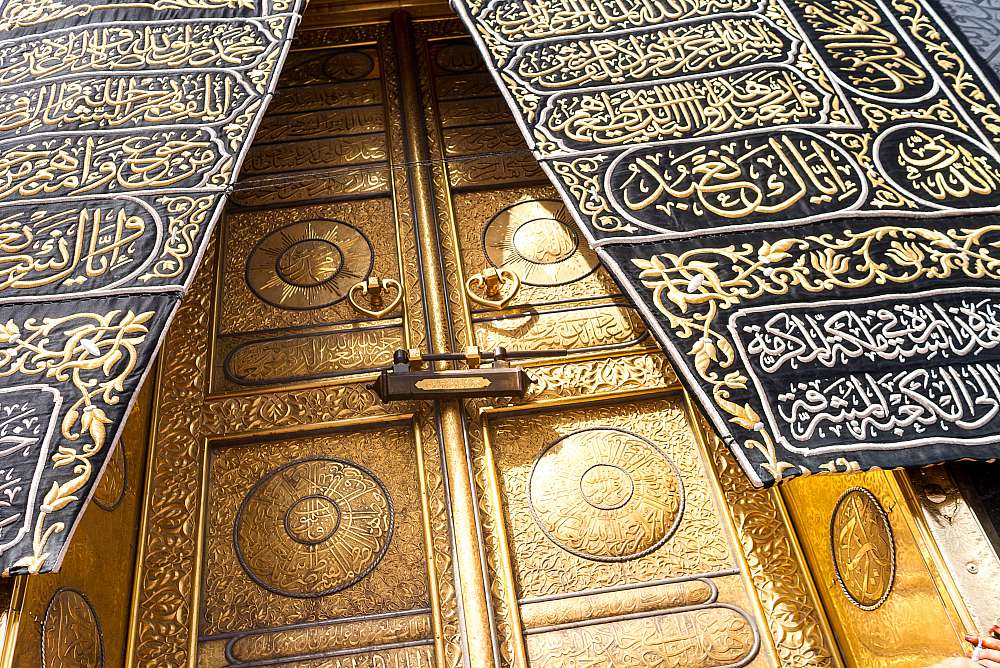
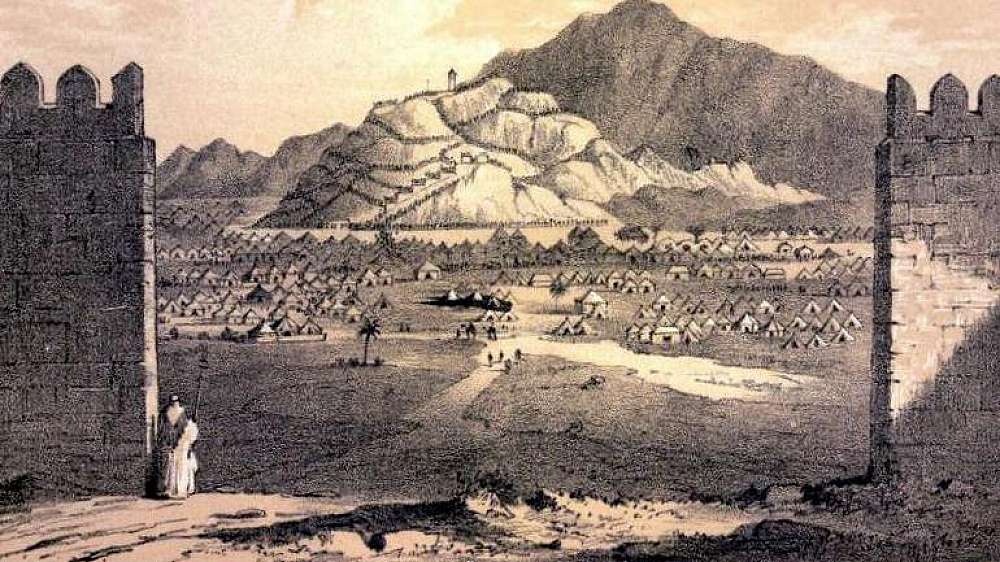
Prelude
Before the 8th of Dhul-Hijjah, a person who wants to perform pilgrimage (Hajj) pronounces the intention to perform Umrah while approaching the Miqat. A second intention for the actual Hajj is pronounced at a later period. There are several rites to properly complete the Hajj and Umrah.
Additional Info:
The rites of Umrah and Hajj may include but are not limited to:
Putting Ihram, performing supererogatory (Sunnah) prayers, making several types of Tawaf, reciting Talbiyah, doing Sa’ee between Safa and Marwah, trimming and/or cutting hair, praying and staying in Mina, praying and standing in Arafah, praying and staying in Muzdalifah, throwing pebbles in three Jamrahs, sacrificing an animal, praying behind Maqam Ibrahim, and drinking from the well of ZamZam.
In the case of Hajj at-Tamattu, after completing the Umrah, the pilgrim trims his/her hair, showers, and changes into everyday clothes. These steps complete the Umrah portion. All restrictions of the Ihram are temporarily lifted.
The pilgrim waits until the 8th of Dhul-Hijjah to start the rites of Hajj.
On the 8th of Dhul-Hijjah, the pilgrim pronounces a new niyyah at the place to perform Hajj. There is no need to go to Miqat for this. The pilgrim changes into Ihram in the prescribed manner and proceeds to Mina soon after the Fajr Prayers.
Proclaiming the Niyyah for Hajj
All acts of worship are preceded by an appropriate proclamation of Niyyah.
Niyyah for Hajj
O Allah! I intend to perform Hajj. Make it easy for me and accept it from me. I make the niyyah for Hajj and enter into the state of Ihram for the sake of Allah alone, the Most High.
Puting on Ihram After Fajr
The distinctive garb of the male pilgrim worn during Hajj or Umrah. It consists of two pieces of white, un-sewn and plain cloth. One of the pieces is wrapped around the midriff to cover his body from just above his navel to his ankles, and the other is draped around his shoulders to cover the upper body. For ladies, their ordinary and unpretentious clothes of everyday wear constitute their Ihram.
Additional Info:
During Ihram, the following acts are forbidden: Cutting hair, shaving any parts of the body, clipping nails, putting perfumes or colognes, killing or hunting animals, sexual intercourse, making marriage proposals, or marriage contracts.
Praying 2 Rak'at Nafl At Miqat
An imaginary boundary around Makkah. A prospective pilgrim cannot cross this boundary without first changing into Ihram. The pilgrim changes into Ihram at Miqat and pronounces the intention to perform Hajj or Umrah.
Additional Info:
The Miqat boundary is anchored by different townships and locations in different directions around the Kaabah. They are a-Thul-Halaifa in the North, b-Yalamlam in the South-East, c-That ' Irq in the North-East, d-al- Juhfah in the North-West, e-Qarn al-Manazil in the East. For people living inside the Miqat area permanently, their place of residence is their Miqat.
Making Tawaf
The devotional act of circumambulating (i.e. walking around) the Ka'bah while reciting prayers and supplications. One complete circuit around the Ka'bah constitutes a shawt (pl. ashwat), and seven ashwat complete one Tawaf.
Additional Info:
During Tawaf (circumambulating), the pilgrim cannot enter the Ka'bah nor stop anywhere around it. He/she must enter into and disappear from the crowd, getting drawn into the roaring river of people who are circumambulating. This is the collective invitation to whoever wants to come to this house. Everyone is dressed in one color and pattern. There is no distinction nor personal promotion: true totality and universality is demonstrated.
Performing Sa'ee
The devotional act of walking seven times between the knolls of Safa and Marwah. This act retraces the footsteps of Hajar, wife of Prophet Ibrahim (pbuh), during her desperate search for water for her infant son Ismail (pbuh) after they were left in the desert by Prophet Ibrahim in response to a Divine vision.
Additional Info:
Safa:
A small knoll approximately 200 yards from the Ka'bah inside the Masjid Al-Haram
Marwah:
A small knoll (i.e., hillock) located approximately one hundred and fifty yards from the Ka'bah.
Reciting Talbiya
A devotional recital of the following words by the piligrim during Hajj and Umrah
Labbaik Allahumma Labbaik. Labbaik La Sharika Laka Labbaik. Innal-Hamda, Wan-Ni'mata Laka wal-Mulk. La Sharika Lak.
Here I am at Thy service O Lord, here I am, Here I am at Thy service and Thou hast no partner. Thine alone is all Praise and All Bounty, and Thine alone is the Sovereignty. Thou hast no partner.
The Talbiyah is a prayer as well as an assertion of the pilgrim's conviction that he/she intends to perform Hajj only for the glory of Allah. The pilgrim starts the recital upon changing into the Ihram, and continues to recite it frequently throughout Hajj. Male pilgrims are required to recite the Talbiyah loudly whereas female pilgrims are required to recite it in low voice.
Going to Mina
The Pilgrim goes to Mina on the 8th of Thul-Hijjah anytime after Fajr prayer but before Zuhr.
Additional Info:
Mina is a desert location approximately three miles from Makkah where several Hajj rites are performed.
Praying in Mina
The pilgrim must perform the daily prayers in Mina starting with Zuhur Prayer.
Additional Info:
These rituals are part of the first day of Hajj, also known as the Day of Tarwiyah. The 4 Rak'ahs prayers must be shortened to 2 Rak'ahs but must not be combined together.
Staying Overnight in Mina
The pilgrim must stay overnight in Mina, perform the Fajr prayer and leave after sunrise on the 9th of Thul-Hijjah.
This completes the first Day of Hajj, also known as the Day of Tarwiyah.
Additional Info:
Prayer upon Departing from Mina:
O Allah! To You I turn, praying to approach Your Bounteous Countenance. Let my sins be forgiven and Hajj be acceptable, and have Mercy on me. Allow me not to be disappointed, for You have power over all things.
Praying in Arafah
After settling down in the tents at Arafah, the pilgrim offers the Zuhur and Asr prayers in qasr (shortened) and Jam' (combined) modes, that is, 2 rak'ats each prayer instead of 4 rak'ats, and the two prayers are offered at the same time, with one adhan and two separate Iqamahs, one each for Zuhur and Asr.
Additional Info:
Once in Arafah, the pilgrim should spend as much time in prayer and remembrance of Allah as possible. This is a very special day and the pilgrim may never see it again. Everyone must make the most of out it.
No Nafl or any other prayers are performed, either before or after the obligatory prayers.
Staying in Arafah
The pilgrim stays in Arafah until sunset. It is recommended to spend the entire time reading the Quran, reciting the Talbiyah, offering supplications, and repenting to Allah.
Additional Info:
Standing in Arafah
In the late afternoon just before sunset, the pilgrims may stand outside the tent facing the Qiblah, and raise their hands supplicating to Allah. There are no prescribed prayers for Wuquf (standing) Arafah. During these sacred moments, the pilgrim is alone with Allah, praying to have his/her sins and lifelong shortcomings get forgiven. Communication with Allah in any language is acceptable.
Leaving to Muzdalifah
After sunset, the pilgrim departs for Muzdalifah quietly, always reciting the Talbiyah and other prayers.
Additional Info:
Muzdalifah is a desert location approximately midway between Mina and Arafah. The pilgrim spends the night of the 10th of Thul-Hijjah here.
Toilets and ablution facilities are available. Naturally, they are very crowded at all times. The pilgrims must be patient, courteous, and understanding to other fellow pilgrims.
Offering Prayers in Muzdalifah
The pilgrim offers Maghrib and Isha prayers combining them and shortening the Isha. Thus, after the adhan is called, three rak'ahs of Maghrib are offered following the usual iqamah.
Another iqamah (but not adhan) is called and then two rak'ahs of Isha are offered.
Additional Info:
The pilgrim stays under the sky at Muzdalifah. No tents or other lodging facilities are available.
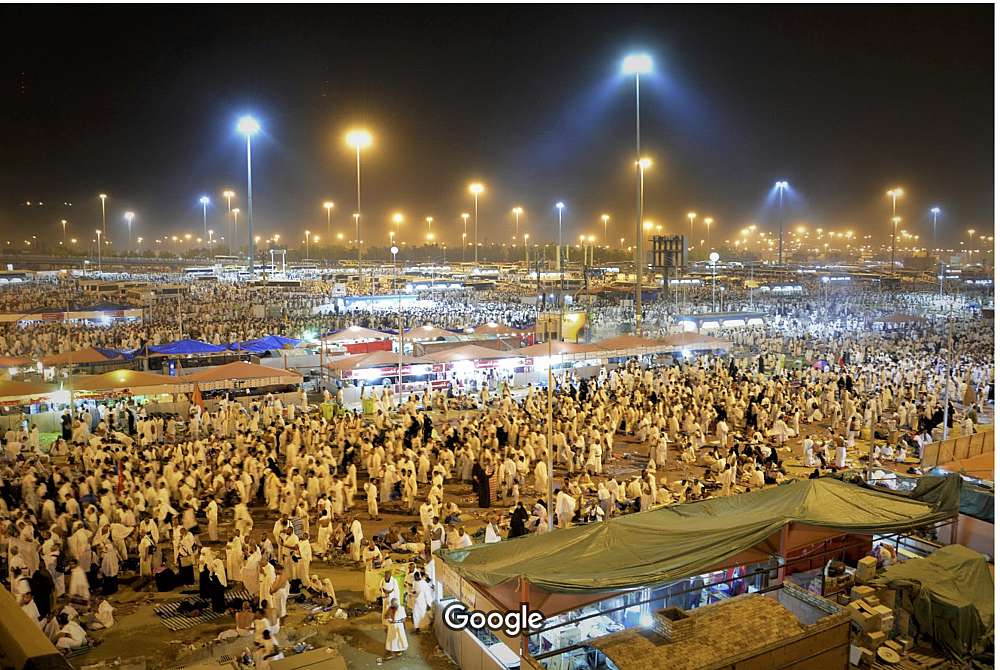
Collecting Pebbles
The pilgrim then walks to the foot of nearby hills, and collects about 70 pea-size pebbles for throwing.
Additional Info:
It is a good idea to collect additional pebbles to make up for accidental losses. The pebbles lying around the bathrooms facilities should not be collected. No one should leave Muzdalifah before Fajr without a legitimate excuse: only women, elderly, and weak people can leave after midnight.
Completion of Second Day
The pilgrim spends the night at Muzdalifah and offers Fajr there. Before sunrise, the pilgrim leaves for Mina on the morning of the 10th of Thul-Hijjah.
Additional Info:
After Fajr prayer, the pilgrim goes through the al-Mash'ar al-Haram and makes du'a until brightness of the sun is widespread. The pilgrim must speed up the walk when passing by the Muhasir valley.
Going to Arafah
After leaving Mina, the pilgrim heads toward Arafah.
Arafah is a desert location approximately nine miles from Makkah. Pilgrims don't have to get crowded on the Mount of Rahmah (Mountain of Mercy). They can stay in any place WITHIN the boundaries of Arafah.
Additional Info:
Prayer Upon Entering Arafah
O Allah! Forgive my sins, help me repent to you, and grant me all that I beseech of You. Whenever I turn, let me see goodness. Allah be praised! All Praise is due to Allah! There is no deity except Allah! And Allah is The Most Great.
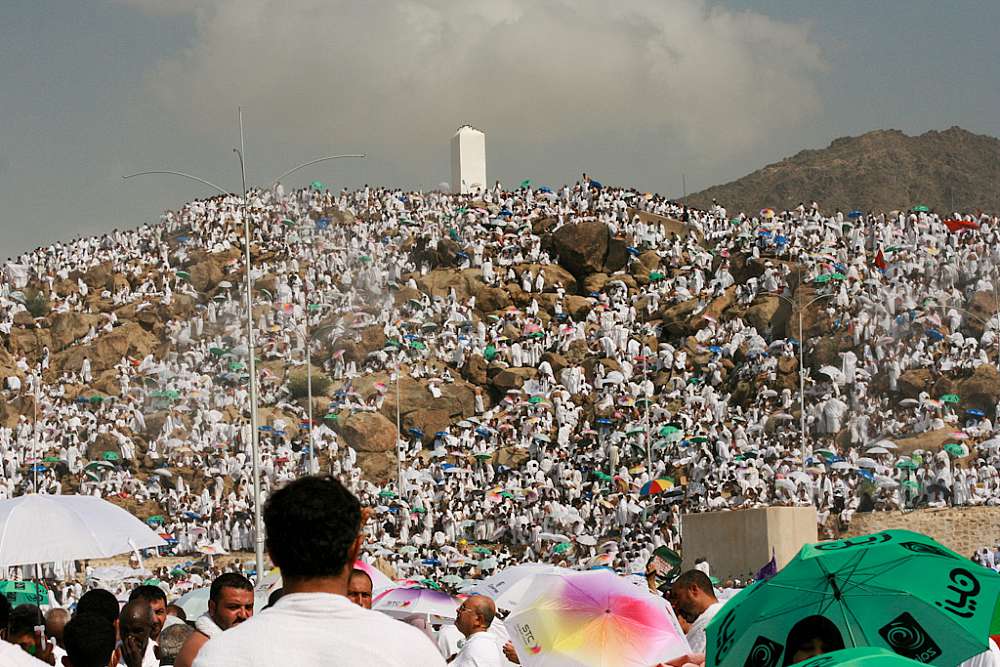
Going to Mina
Due to the large crowd going to Mina, the pilgrim must remain calm, avoid pushing people, and must be respectful to others.
Additional Info:
Weak and sick people can appoint others to throw stones at the Jamrahs in Mina on behalf of them.
Throwing Pebbles
The pilgrim stones the Jamrat al-Kubra (Jamrat al-Aqabah) only, preferably before midday. Stoning the pillar symbolizes stoning the devil. the pebbles must touch the inside of the Jamrat's fence.
Additional Info:
The Jamrat al-Kubra is the closest to Makkah. While throwing the stones, the pilgrim recites Bismillah, Allah-u-Akbar with each pebble. The size of the pebbles should not be big: anywhere between 1-1.5 cm. The pilgrim may throw either from under the bridge or from over it.
Sacrificing an Animal
A sacrifice is now required for the pilgrim performing Hajj al-Tamattu or Hajj al-Qiran. The choice of the animal is either a sheep, or 1/7th of a cow or a camel shared with other people.
Additional Info:
For the pilgrim performing Hajj al-Ifrad, sacrificing the animal is recommended but not required.
The pilgrim should always choose the best animal and avoid animals which don't look healthy or have defects. The pilgrim can slaughter him/herself or appoint someone to do it on his/her behalf.
One third of the meat can be consumed, one third offered as a gift and one third distributed to the poor people. The sacrifice can be performed between the 10th and the 13th of Thul-Hijjah but not after the 13th.
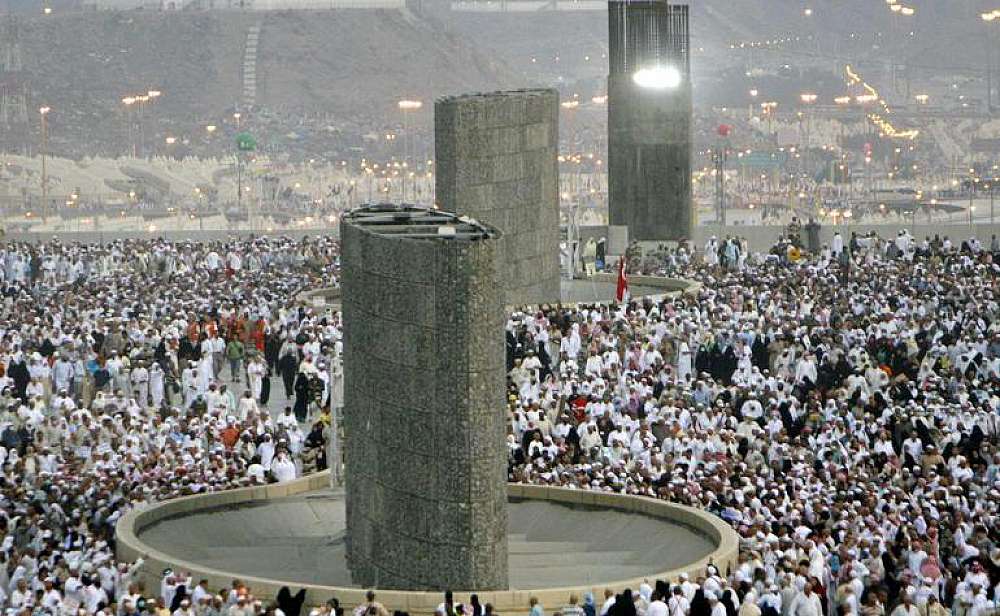
Cutting Hair
The pilgrim may now shave/trim the hair, shower, and change into everyday clothes. The hair may be shaved or trimmed for men. It is recommended to start from the right side. For women, trimming only a finger tip's length is required.
Additional Info:
Sacrificing an animal, cutting hair, and performing Tawaf al-Ifadah are alternate rituals. There is no specific order to perform them. All ritual places must be kept clean.
At this point in time, the regulations for Ihram no longer apply except that the pilgrim can not have conjugal relations with his/her spouse until after Tawaf al-Ifadah and Sa'ee. This is known as at-Tahalul al-Asghar, or a partial ending of the state of Ihram.
Going to Mina
Due to the large crowd going to Mina, the pilgrim must remain calm, avoid pushing people, and must be respectful to others.
Additional Info:
Weak and sick people can appoint others to throw stones at the Jamrahs in Mina on behalf of them.
Celebrating Eidul-Adha
Starting from the 10th of Thul-Hijjah and on, Muslims around the world celebrate this special occasions.
Additional Info:
EID-AL-ADHA is celebrated on the tenth day of Zul-hijjah, the 12th and the last month of the Islamic calendar. It is a very joyous day; it is a feast of self-sacrifice, commitment and obedience to Allah. It commemorates the great act of obedience to Allah by the Prophet Ibrahim (pbuh) in showing his willingness to sacrifice his son Ismael (pbuh). Allah accepted his sacrifice and replaced Prophet Ismael (as) with a lamb.
Going to Makkah
The pilgrim proceeds to al-Masjid al-Haram in Makkah for Tawaf al-Ifadah.
Additional Info:
The pilgrim has the option to postpone Tawaf al-Ifadah to a later time. Menstruating women should not make tawaf until their period stops. If the pilgrim selected Hajj Ifrad or Qiran and has already made Sa'ee with the first Tawaf (the visiting Tawaf), there is no need to make Sa'ee again.
Performing Tawaf al-Ifadah
The pilgrim performs the Tawaf al-Ifadah after taking off the Ihram and changing into everyday clothes and before returning to Mina for pebble throwing.
Additional Info:
Ihram, Idtiba and Ramal are not required in this Tawaf. However, Sa'ee is required of a Mutamatti, but is not required for Qarin or a Mufrid.
Maqam Ibrahim
The step-stone used by the Prophet Ibrahim (pbuh) during the original construction of the Ka'bah.
The stone carries the imprints of his feet, and is housed in a glass enclosure on the North side of the Ka'bah.
After completing the Tawaf, it is good to pray 2 rak'ahs behind Maqam Ibrahim, if possible.
Additional Info:
Prayer at Maqam Ibrahim
O Allah! You know that which I keep secret and that which I disclose. Grant me Your pardon. You know my needs; grant me my wishes. You know that which is in my breast; forgive me my sins. O Allah! I seek from You a Faith that will saturate my heart, and a true conviction that will make me realize that naught can befall me except what You have decreed for me, and that I may find contentment in whatever You have given me. You are my patron in this world and the Hereafter. Allow me to die in a state of Islam and to be counted among the righteous. O Allah! On this occasion of our presence in this place, let not any of our sins go unforgiven, nor any of our worries undispelled, nor any of our needs unfulfilled or unfacilitated by You. And let all our tasks be made easy, and our minds relieved, and our hearts illuminated and our actions judged as pious. O Allah! Allow us to die as Muslims and to join the ranks of the virtuous without any distress. Amen, O Lord of the Universe.

Drinking from Zamzam
After completing the prayer at Maqam Ibrahim, the pilgrim may visit the Zamzam area and drink from the water.
Additional Info:
Prayer at ZamZam
O Allah! I seek from You profitable knowledge and bounteous sustenance and a cure from all ailments through Your Mercy, O Most Merciful of the mercifuls!
Learn more: The History of Zamzam
Performing Sa'ee between Safa and Marwah
The devotional act of walking seven times between the knolls of Safa and Marwah.
This act retraces the footsteps of Hajar, wife of the Prophet Ibrahim (pbuh), during her desperate search for water for her infant son Ismail (pbuh) after they were left in the desert by Prophet Ibrahim in response to a Divine vision.
Additional Info:
Safa:
A small knoll approximately 200 yards from the Ka'bah inside the Masjid Al-Haram
Marwah:
A small knoll (i.e., hillock) located approximately one hundred and fifty yards from the Ka'bah.
Returning to Mina
The pilgrim returns to Mina and stays there until the 12th or 13th of Thul-Hijjah for throwing the pebbles.
Performing Prayers in Mina
Back in Mina, the pilgrim performs all of the daily prayers, shortening the 4 Rak'ats prayers to 2 Rak'ats, but without combinig them.
Additional Info:
The minimum stay in Mina should exceed most of the night. Otherwise, the pilgrim is required to make a sacrifice. This is one of the best opportunities to acquire knowledge from the scholars on duty.
Stoning the Jamrahs
The pilgrim stones the The first Jamrah, then the Middle, and finally the Big one in the same consecutive order, after midday on all three days.
Additional Info:
Throwing on the 13th of Thul-Hijjah is optional. The pilgrim may return to Makkah after throwing pebbles on the 12th of Thul-Hijjah to perform Tawaf al-Wada (farewell circumambulation).
Each throwing is constituted of 7 pebbles with the pilgrim reciting Allahu Akbar and making Dua.
The last throwing is constituted of 7 pebbles with the pilgrim reciting Allahu Akbar but this time, without making Dua'.
Staying in Mina
The pilgrim should stay in Mina minimum from Fajr until Midnight.
Additional Info:
It is very important to keep Mina clean, and maintain proper contact with the pilgrims.
Extending the Stay
For the pilgrims who intend to stay only two days, they must leave before Maghrib.
Additional Info:
For those intending to stay more, they can collect more pebbles.
End of 4th Day.
Stoning the Jamrahs
On the 12th of Thul-Hijjah, the same procedures as the 11th take place. The pilgrim stones the The first Jamrah, then the Middle, and finally the Big one in the same consecutive order, after midday on all three days.
Additional Info:
Throwing on the 13th of Thul-Hijjah is optional. The pilgrim may return to Makkah after throwing pebbles on the 12th of Thul-Hijjah to perform Tawaf al-Wada (farewell circumambulation).
Each throwing is constituted of 7 pebbles with the pilgrim reciting Allahu Akbar and making Dua.
This throwing is constituted of 7 pebbles with the pilgrim reciting Allahu Akbar but this time, without making Dua'.
Returning to Makkah
Pilgrims return to Makkah before Maghrib time after completing the stoning to perform Tawaf al-Wada.
Additional Info:
At this point, the crowd is very large and pilgrims should not push, but instead be courteous and offer help to those who need it.
Tawaf al-Wada
This is the farewell Tawaf that a pilgrim performs just before leaving Makkah for other destinations. It is the same as other Tawaf, going in 7 circuits, starting from the black stone line. After completing the Tawaf, it is good but not required to pray 2 Rak'ahs behind Maqam Ibrahim, or, if not possible, to pray any other 2 Rak'ahs facing the Kaabah.
Additional Info:
Though it is neither obligatory nor related to Hajj, it is recommended for a pilgrim to visit Prophet Muhammad's mosque in Madinah. This could be done before or after performing Hajj.
Departing from Makkah
This completes the Hajj journey. It is recommended to leave Makkah as soon as the pilgrim completes the pilgrimage. The pilgrim also asks Allah to accept the rituals and promises to abide by the divine commands.
Additional Info:
Prophet Muhammad (pbuh) said: "Whoever goes to Hajj without obscenity he or she will be forgiven as a new-born."
Another Hadith states:
"A Sound Hajj has no reward except Paradise".
Learn more: Article 1 | Article 2 | Article 3 | Article 4 | Article 5 | Article 6 | Article 7 | Article 8 | Article 9 | Article 10 | Article 11